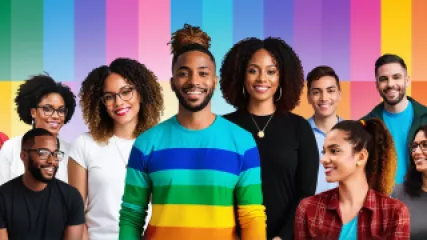Exploring Virtual Therapy for LGBTQ+: An Interview with a Mental Wellness Expert
Welcome to our interview feature, where we dive deep into the world of mental wellness and explore virtual therapy for LGBTQ+ individuals. Today, we have the privilege of speaking with a mental wellness expert who will shed light on the importance of online counseling and support for the LGBTQ+ community. This interview aims to provide valuable insights into the benefits of virtual therapy, particularly for those who identify as LGBTQ+.
Meet Our Expert: Toby Graham
Our mental wellness expert for today's interview is Toby Graham, a licensed mental health counselor with extensive experience in providing online therapy services. Toby has dedicated their career to promoting mental health and well-being among individuals from diverse backgrounds, with a particular focus on LGBTQ+ individuals.
Introduction to Virtual Therapy for LGBTQ+
Interviewer: Thank you for joining us today, Toby. To start off, could you briefly explain what virtual therapy entails?
Toby: Absolutely. Virtual therapy, also known as online therapy or teletherapy, involves providing mental health counseling and support through digital platforms such as video calls, instant messaging, or phone calls. It offers individuals the opportunity to receive therapy from the comfort of their own homes, eliminating barriers such as geographical distance or physical limitations.
Interviewer: That sounds incredibly convenient and accessible. How does virtual therapy specifically benefit LGBTQ+ individuals?
Toby: Virtual therapy has proven to be particularly beneficial for LGBTQ+ individuals for several reasons. Firstly, it provides a safe and confidential space for people to express their thoughts and emotions without fear of judgment or discrimination. This is especially important for individuals who may live in unsupportive environments or communities.
Secondly, online therapy allows LGBTQ+ individuals to access mental health professionals who specialize in LGBTQ+ issues, even if they are not available locally. It can be challenging to find therapists who are knowledgeable and sensitive to the unique experiences faced by LGBTQ+ individuals, but virtual therapy opens up a wider pool of professionals.
Lastly, virtual therapy offers flexibility in terms of scheduling appointments. Many LGBTQ+ individuals lead busy lives and may face additional challenges such as work schedules, family responsibilities, or discrimination-related stressors. Online therapy allows for greater convenience and the ability to choose appointment times that suit their needs.
The Role of Cognitive Behavioral Therapy (CBT) in Online Counseling
Interviewer: Thank you for highlighting those benefits, Toby. Could you explain how cognitive-behavioral therapy (CBT) can be incorporated into virtual therapy sessions?
Toby: Certainly. Cognitive-behavioral therapy is a widely used and evidence-based approach that focuses on identifying and challenging negative thought patterns and behaviors. It is highly adaptable to virtual therapy sessions. Therapists can guide individuals through various exercises and techniques using video calls or written messages.
For example, therapists can help clients recognize and reframe negative self-talk, develop coping strategies for anxiety or depression, or practice behavioral experiments to challenge unhelpful beliefs. CBT can be effectively delivered online, and therapists can provide worksheets or resources digitally to support the therapeutic process.
The Importance of Mental Health Support for LGBTQ+ Individuals
Interviewer: Mental health support is crucial for everyone, but why is it particularly important for LGBTQ+ individuals?
Toby: LGBTQ+ individuals often face unique challenges related to their sexual orientation, gender identity, and societal prejudice. These challenges can significantly impact their mental well-being. Research consistently shows higher rates of mental health issues such as anxiety, depression, and suicide ideation among LGBTQ+ individuals compared to the general population.
Having access to mental health support that is affirming, knowledgeable, and sensitive to LGBTQ+ experiences is essential. It provides a space for individuals to navigate the complexities of their identities, process any trauma or discrimination they may have faced, and develop coping strategies to enhance their overall well-being.
Addressing Mental Health Disparities in the LGBTQ+ Community
Interviewer: How can virtual therapy help address mental health disparities within the LGBTQ+ community?
Toby: Virtual therapy plays a crucial role in bridging the gap between LGBTQ+ individuals and mental health professionals who understand their unique experiences. It ensures that individuals living in areas with limited LGBTQ+-affirming resources still have access to quality care.
Additionally, online therapy reduces barriers such as transportation costs, time constraints, or fear of being recognized when seeking in-person therapy. This can be particularly beneficial for transgender or non-binary individuals who may face significant challenges accessing gender-affirming care in their local communities.
By making mental health services more accessible, virtual therapy helps address mental health disparities within the LGBTQ+ community and promotes greater overall well-being.
Wrap-up and Final Thoughts
Interviewer: Thank you so much for sharing your expertise, Toby. Before we conclude, is there anything else you would like to add?
Toby: It has been a pleasure discussing the benefits of virtual therapy for LGBTQ+ individuals. I want to emphasize that seeking mental health support is a sign of strength, and it is essential for everyone, regardless of their sexual orientation or gender identity.
If you are an LGBTQ+ individual struggling with your mental health, I encourage you to reach out and explore virtual therapy options. There are compassionate professionals available who can provide the support you deserve.
Virtual therapy has revolutionized mental health counseling online and has proven to be an invaluable resource for LGBTQ+ individuals seeking support. By eliminating barriers and providing a safe and inclusive space, online therapy offers a lifeline to those who may face unique challenges and discrimination.
If you or someone you know identifies as LGBTQ+ and could benefit from mental wellness guidance online, consider exploring virtual therapy options. Remember, your mental health matters, and there is support available to help you thrive.






